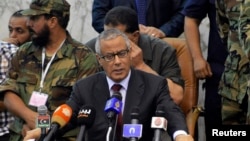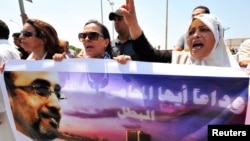Libyan Prime Minister Ali Zeidan is promising to re-organize his government following days of chaos in Benghazi that saw a mass jail breakout, bombings, anti-Islamist protests and a spate of assassinations.
“We are about to make a cabinet reshuffle and decrease the number of ministries to ensure a better performance to face the urgent situation,” Zeidan told a press conference after Libya’s second largest city was rocked by the worst violence to hit it since September’s attack on the U.S. consulate and the killing of Ambassador Christopher Stevens.
“What is happening is an attempt to obstruct the state’s progression,” the Libyan prime minister said.
Zeidan said those behind the jail breakout, the bombings and the killing of an anti-Islamist political activist and two security officials over the weekend were intent on sowing chaos in order to delay forthcoming elections for a body to draft a constitution.
The lawlessness, mainly involving former rebel militias, has hampered Libya’s efforts to establish a democratic government following the toppling of Moammar Gadhafi in a NATO-backed uprising in 2011.
Zeidan defended his government’s performance, saying security plans were constantly reviewed and had been ahead of the weekend’s violence. “We reinforced the army in Benghazi and Tripoli to enable it to carry out its work better.”
But the reviews and the reinforcements appeared not to have helped the government maintain law and order in Benghazi. Even in the capital Tripoli, which has recently seen fighting between militias, the government was unable to prevent rival protesters from wrecking the political offices of Islamists and a liberal party alliance over the weekend.
Zeidan’s pledge to reshuffle his cabinet was quickly overshadowed by more violence overnight in Benghazi when a soldier was killed in fighting between armed groups and security forces.
“Clashes broke out between special forces and an unknown armed group,” Mohammed al-Hijazy, a spokesman for Benghazi security operations, said. “At least one soldier was killed. The special forces have now retaken control.”
Those clashes erupted after two powerful bombs exploded outside the city’s courthouse and another building used by the judiciary. The explosions injured more than 40 people, according to the ministry of health, and demonstrators later took to the streets to denounce the violence.
It was during those demonstrations that Zeidan made his announcement about reorganizing the government.
Attack on Muslim Brotherhood
The mayhem in Benghazi, though, started last Friday when a mob attacked the offices of the Muslim Brotherhood following the assassination of political activist Abdelsalam al-Mosmary, a prominent critic of the Brotherhood, as he was leaving a mosque in the city.
On Saturday, more than a 1,100 inmates broke-out of Benghazi’s Kuafiya prison after a riot inside the jail.
The escapees also had assistance from groups outside the jail, according to Benghazi security sources, who said there were gunmen outside the prison as inmates inside began set fires.
About 100 of the inmates have been recaptured and security forces were searching the city for the rest.
Underlining the weakness of the government and the fledgling national security forces, Interior Ministry officials publicly offered escapees a review of their sentences, if they give themselves up.
The prime minister’s promise to restore order to Benghazi hasn’t satisfied some members of his government. The minister of social affairs, Kamila Khamis Al-Mazini, has announced her resignation in protest at the deteriorating security situation in the city.
“With my appreciation and loyalty to the martyrs of 17 February Revolution, the wounded, amputees, missing people and retirees and all Libyans, I am announcing my irreversible resignation from the government,” she said in a statement.
A Benghazi lawmaker citing a similar reason has also quit the country’s provisional parliament, the General National Congress.
Benghazi at center of troubles
Benghazi, home to some of the country’s most powerful rebel militias, has been plagued by violence for the past year. Last September, radical Islamist groups coordinated an attack on the U.S. Consulate, leaving Ambassador Stevens and three other Americans dead. There have been more than 30 assassinations in the city, many of former Gadhafi security officials.
In his few months in office, Zeidan has tried to develop reform plans and bring more order to government operations, but has clashed frequently with the General National Congress, especially its Islamist parties.
He has tried to persuade militias to disarm and enlist in the government security forces, but there has been little progress in building up the army or the police, both heavily outnumbered by the militias.
In May, the country was engulfed in political turmoil when the militias, the Muslim Brotherhood and some other Islamists groups surrounded government offices in Tripoli and forced adoption of a law banning former Gadhafi regime officials from holding political office or jobs in the civil service.
The hope among many politicians was that once the law banning former Gadhafi officials was passed, the militias would start to disband. The latest round of violence is putting those hopes to the test.
“We are about to make a cabinet reshuffle and decrease the number of ministries to ensure a better performance to face the urgent situation,” Zeidan told a press conference after Libya’s second largest city was rocked by the worst violence to hit it since September’s attack on the U.S. consulate and the killing of Ambassador Christopher Stevens.
“What is happening is an attempt to obstruct the state’s progression,” the Libyan prime minister said.
Zeidan said those behind the jail breakout, the bombings and the killing of an anti-Islamist political activist and two security officials over the weekend were intent on sowing chaos in order to delay forthcoming elections for a body to draft a constitution.
The lawlessness, mainly involving former rebel militias, has hampered Libya’s efforts to establish a democratic government following the toppling of Moammar Gadhafi in a NATO-backed uprising in 2011.
Zeidan defended his government’s performance, saying security plans were constantly reviewed and had been ahead of the weekend’s violence. “We reinforced the army in Benghazi and Tripoli to enable it to carry out its work better.”
But the reviews and the reinforcements appeared not to have helped the government maintain law and order in Benghazi. Even in the capital Tripoli, which has recently seen fighting between militias, the government was unable to prevent rival protesters from wrecking the political offices of Islamists and a liberal party alliance over the weekend.
Zeidan’s pledge to reshuffle his cabinet was quickly overshadowed by more violence overnight in Benghazi when a soldier was killed in fighting between armed groups and security forces.
“Clashes broke out between special forces and an unknown armed group,” Mohammed al-Hijazy, a spokesman for Benghazi security operations, said. “At least one soldier was killed. The special forces have now retaken control.”
Those clashes erupted after two powerful bombs exploded outside the city’s courthouse and another building used by the judiciary. The explosions injured more than 40 people, according to the ministry of health, and demonstrators later took to the streets to denounce the violence.
It was during those demonstrations that Zeidan made his announcement about reorganizing the government.
Attack on Muslim Brotherhood
The mayhem in Benghazi, though, started last Friday when a mob attacked the offices of the Muslim Brotherhood following the assassination of political activist Abdelsalam al-Mosmary, a prominent critic of the Brotherhood, as he was leaving a mosque in the city.
On Saturday, more than a 1,100 inmates broke-out of Benghazi’s Kuafiya prison after a riot inside the jail.
The escapees also had assistance from groups outside the jail, according to Benghazi security sources, who said there were gunmen outside the prison as inmates inside began set fires.
About 100 of the inmates have been recaptured and security forces were searching the city for the rest.
Underlining the weakness of the government and the fledgling national security forces, Interior Ministry officials publicly offered escapees a review of their sentences, if they give themselves up.
The prime minister’s promise to restore order to Benghazi hasn’t satisfied some members of his government. The minister of social affairs, Kamila Khamis Al-Mazini, has announced her resignation in protest at the deteriorating security situation in the city.
“With my appreciation and loyalty to the martyrs of 17 February Revolution, the wounded, amputees, missing people and retirees and all Libyans, I am announcing my irreversible resignation from the government,” she said in a statement.
A Benghazi lawmaker citing a similar reason has also quit the country’s provisional parliament, the General National Congress.
Benghazi at center of troubles
Benghazi, home to some of the country’s most powerful rebel militias, has been plagued by violence for the past year. Last September, radical Islamist groups coordinated an attack on the U.S. Consulate, leaving Ambassador Stevens and three other Americans dead. There have been more than 30 assassinations in the city, many of former Gadhafi security officials.
In his few months in office, Zeidan has tried to develop reform plans and bring more order to government operations, but has clashed frequently with the General National Congress, especially its Islamist parties.
He has tried to persuade militias to disarm and enlist in the government security forces, but there has been little progress in building up the army or the police, both heavily outnumbered by the militias.
In May, the country was engulfed in political turmoil when the militias, the Muslim Brotherhood and some other Islamists groups surrounded government offices in Tripoli and forced adoption of a law banning former Gadhafi regime officials from holding political office or jobs in the civil service.
The hope among many politicians was that once the law banning former Gadhafi officials was passed, the militias would start to disband. The latest round of violence is putting those hopes to the test.





